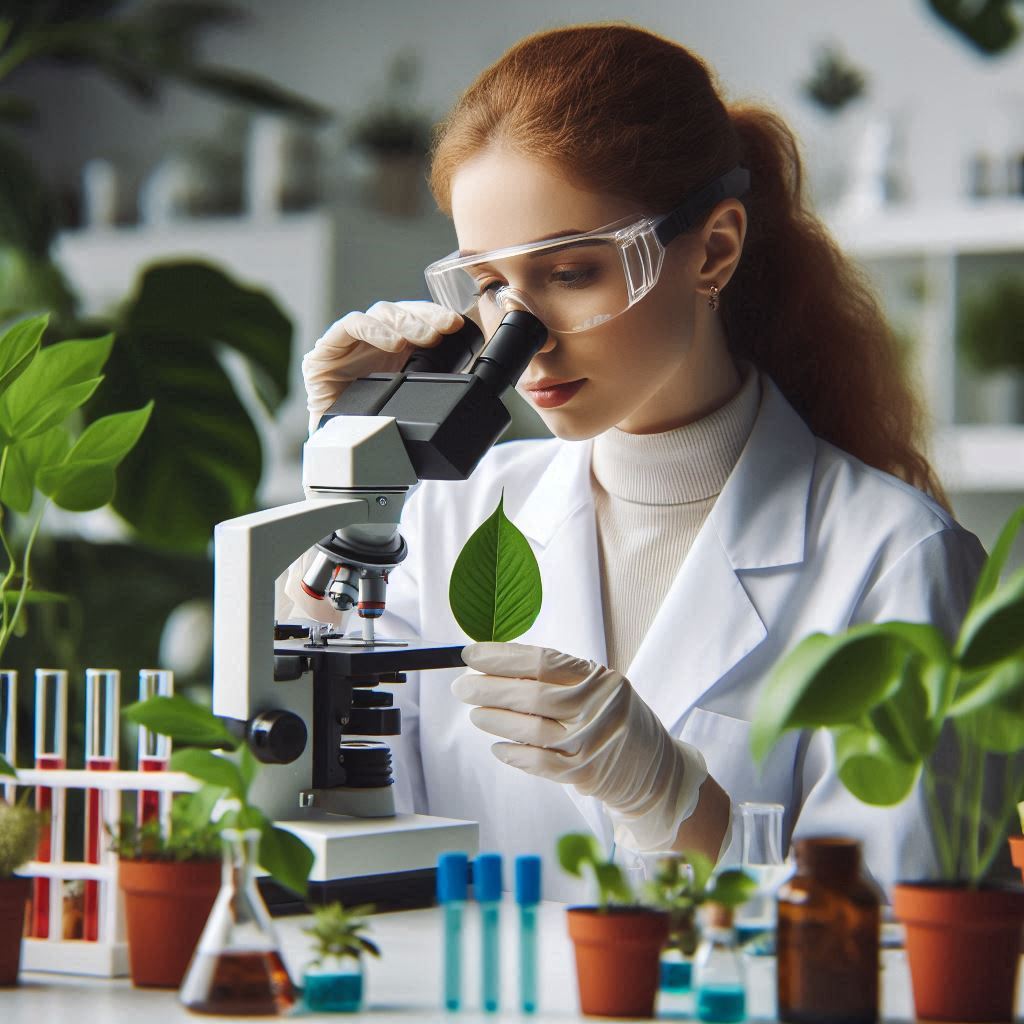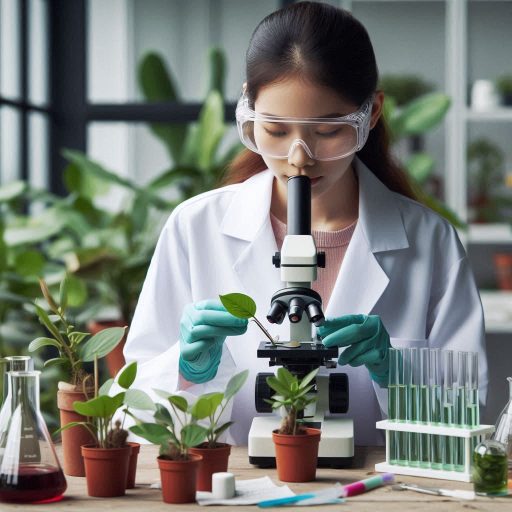Introduction
Plant science internships offer valuable opportunities for aspiring professionals in the field.
These internships bridge the gap between academic learning and real-world application.
Gaining practical experience is essential for building a successful career in plant science.
Internships allow students to apply their knowledge, develop skills, and explore various career paths.
Practical experience helps interns understand the daily responsibilities of plant scientists.
They can work on projects that contribute to advancements in agriculture and sustainability.
Interns also learn to navigate challenges they might face in the industry.
This blog post aims to inform readers about what to expect from plant science internships.
We will cover various aspects, including the application process, day-to-day tasks, and skill development.
We will also address the importance of networking and building relationships during internships.
By understanding these elements, readers can prepare themselves for a rewarding internship experience.
Ultimately, plant science internships serve as a launching pad for future careers.
They provide a foundation for success in a rapidly evolving field.
Readers will gain insights into how to make the most of their time in internships.
What are plant science internships?
Plant Science Internships and Their Purpose
Plant science internships offer practical experiences in agricultural research and plant biology.
These internships allow students and recent graduates to apply their academic knowledge in real-world settings.
The purpose of these internships is to enhance learning through hands-on experience in various aspects of plant science.
Internships also bridge the gap between theory and practice, preparing participants for future careers in the field.
Various Roles and Responsibilities Involved in Plant Science Internships
Interns in plant science may take on various roles and responsibilities.
They might assist in fieldwork, collecting data on crop performance and environmental factors.
This hands-on work allows interns to gain valuable experience in experimental design and data analysis.
Interns also participate in laboratory work, conducting experiments and analyzing plant samples.
They may learn techniques such as DNA extraction, tissue culture, and biochemical assays.
These lab skills are crucial for understanding plant physiology and genetics.
In addition, interns may help with literature reviews and research presentations.
They often collaborate with scientists and fellow interns, contributing to ongoing research projects.
This collaboration fosters teamwork and communication skills essential for any scientific career.
Benefits of Participating in Such Internships
Participating in plant science internships offers numerous benefits.
First, these internships provide valuable practical experience that enhances resumes.
Employers often look for candidates with hands-on experience in their field.
Internships also help participants build professional networks.
Interns connect with industry professionals, which can lead to future job opportunities.
These connections can also provide mentorship, guidance, and career advice.
Moreover, internships improve understanding of the agricultural industry.
Interns gain insights into current challenges and innovations in plant science.
This knowledge helps them become more informed professionals.
Additionally, internships often lead to the development of critical skills.
Interns learn problem-solving, data analysis, and research methods relevant to plant science.
These skills are essential for any career in agriculture or related fields.
Finally, internships can boost confidence and clarify career goals.
Interns experience various roles within plant science, helping them discover their interests.
This exploration can guide them in choosing a specific career path or area of focus.
Plant science internships provide essential experiences for aspiring scientists.
They define the purpose of hands-on learning in plant research, cover diverse responsibilities, and offer significant benefits.
Participating in these internships equips individuals with valuable skills, connections, and insights into the agricultural industry.
Engaging in such experiences enhances career prospects and fosters personal growth.
Read: Challenges and Rewards: The Dual Life of an U.S. Environmental Scientist
Finding plant science internships
Tips on Where to Look for Plant Science Internships
Finding plant science internships requires a strategic approach.
Start by checking with your academic institution.
Many universities have dedicated career services that list internship opportunities.
Faculty members often have connections with research institutions and companies in the field.
Online job boards are another excellent resource.
Websites like Indeed, Glassdoor, and LinkedIn frequently list internships in plant science.
Use specific keywords such as ‘plant biology,‘ ‘agriculture,‘ and ‘horticulture‘ for better search results.
Industry associations also provide valuable leads.
Organizations like the American Society of Plant Biologists and the American Phytopathological Society often post internships on their websites.
They may also offer networking events where you can meet industry professionals.
Consider volunteering or working at local botanical gardens or research facilities.
These experiences can lead to internship opportunities or valuable connections.
Gaining hands-on experience in these settings enhances your resume and skill set.
Importance of Networking in Securing Internship Opportunities
Networking plays a crucial role in finding plant science internships.
Building relationships with professors, classmates, and industry professionals can open doors.
Attend conferences, workshops, and seminars related to plant science to expand your network.
Utilize social media platforms like LinkedIn to connect with professionals in the field.
Join relevant groups and participate in discussions to showcase your interest.
This engagement can lead to internship referrals and opportunities.
Informational interviews can also be beneficial.
Reach out to professionals and request short meetings to discuss their career paths.
These conversations can provide insights into potential internships and valuable advice.
Resources and Websites That List Plant Science Internships
Several resources and websites specialize in listing plant science internships.
Here are a few to consider:
- Internships. com: This site provides a comprehensive database of internships in various fields, including plant science.
- AgCareers.com: Focused on agricultural careers, this website lists internships, job openings, and career resources related to agriculture.
- SimplyHired: This job search engine allows users to filter results for internships specifically in plant science and related fields.
- WayUp: Designed for students and recent graduates, this platform lists internships across various industries, including plant science.
- University Career Services: Many universities maintain their own databases of internship opportunities, accessible through their career services websites.
- Professional Associations: Organizations like the Crop Science Society of America and the Society for Range Management often post internship listings.
Finding plant science internships involves strategic searching and networking.
Explore various resources, including university career services and online job boards.
Networking with professionals and engaging in industry events can lead to valuable opportunities.
Utilize the resources mentioned to enhance your search and secure a rewarding internship in plant science.
Read: Job Market Trends: Future of Chemistry Jobs in America
Application process
Typical Application Requirements for Plant Science Internships
The application process for plant science internships varies by organization.
Most internships require an online application form.
This form usually requests your contact information and academic background.
You must also submit a resume and cover letter.
Some internships might require transcripts or letters of recommendation.
Always check specific requirements listed in the internship posting.
Prepare to answer questions about your interest in plant science.
You may need to outline your relevant skills and experiences.
Guidance on How to Create a Strong Resume and Cover Letter for These Internships
Creating a strong resume is essential for securing an internship.
Start with a clear, professional format.
Include your name, contact information, and education at the top.
Focus on relevant coursework and projects related to plant science.
Highlight any lab experience, research projects, or fieldwork.
List relevant skills, such as proficiency in laboratory techniques or data analysis software.
Craft a tailored cover letter for each application.
Address the letter to the hiring manager, if possible.
Start with a strong opening that captures attention.
Clearly express your interest in the internship and the organization.
Discuss why you are a suitable candidate.
Highlight relevant experiences and skills that match the internship requirements.
Keep the cover letter concise and focused, ideally one page long.
Additional Steps or Materials That May Be Required for Specific Internships
In addition to resumes and cover letters, some internships require additional materials.
For research-focused positions, you may need to submit a writing sample.
This sample should demonstrate your scientific writing ability.
Some internships may also require a portfolio showcasing relevant projects.
Be prepared to provide transcripts for internships emphasizing academic performance.
Networking can also enhance your application process.
Informational interviews with professionals can provide insights into specific internship expectations.
Use this opportunity to ask about any additional materials they found beneficial during their internships.
Before submitting your application, double-check for errors.
Proofread your resume and cover letter for typos and grammatical mistakes.
Ensure all documents are formatted correctly and aligned with the internship requirements.
Follow any specific submission instructions provided in the posting.
This attention to detail reflects your professionalism and enthusiasm for the position.
The application process for plant science internships includes several essential components.
A strong resume and tailored cover letter are crucial for success.
Be aware of any additional requirements specific to the internship.
By preparing thoroughly, you can enhance your chances of securing a valuable plant science internship.
Read: Challenges and Rewards: Navigating the Chemist Career Path

What to Expect During the Internship
Day-to-Day Tasks and Activities That Interns May Be Involved In
During a plant science internship, expect a variety of day-to-day tasks.
Interns may assist in laboratory experiments, preparing samples for analysis.
This preparation can involve measuring, weighing, and mixing chemical solutions.
You might also conduct fieldwork, collecting data on plant growth and health.
Recording observations accurately is crucial for research accuracy.
Interns often participate in planting, watering, and maintaining experimental plots.
This hands-on experience helps you understand plant growth conditions.
You may also help with data entry and analysis using software tools.
This process can include creating spreadsheets and generating reports.
Attending team meetings to discuss ongoing projects is common.
You will collaborate with other interns and staff to share insights.
Learning Opportunities and Hands-On Experiences That Interns Can Expect
Internships offer invaluable learning opportunities.
Interns gain practical skills that enhance academic knowledge.
You will learn techniques specific to plant science research, such as DNA extraction and analysis.
Understanding experimental design and statistical analysis is often emphasized.
Internships also expose you to new technologies.
For example, you might work with imaging tools or remote sensing equipment.
Engaging in these activities deepens your understanding of modern plant science.
Field experience enables you to observe real-world applications of theoretical concepts.
Participating in workshops and seminars can further expand your knowledge base.
Interns should be proactive in seeking learning opportunities.
Ask questions and express interest in different projects.
This initiative can lead to additional responsibilities and experiences.
Importance of Mentorship and Guidance From Supervisors During the Internship
Mentorship plays a vital role in the internship experience.
A supportive supervisor can provide valuable insights and guidance.
They help you navigate challenges and answer your questions.
Regular check-ins foster communication and ensure you are on track.
Supervisors often provide constructive feedback on your work.
This feedback helps you improve your skills and understanding.
They may also introduce you to professional networks and resources.
This connection can lead to future job opportunities.
Building a relationship with your mentor is essential.
Be open to discussing your goals and aspirations.
They can offer advice on career paths and further education options.
Their experiences can guide your professional development.
Plant science internships offer diverse tasks and valuable experiences.
Interns engage in hands-on activities that enhance their learning.
Mentorship from supervisors significantly enriches the internship experience.
By embracing these opportunities, you can develop essential skills for your future career in plant science.
Transform Your Career Today
Unlock a personalized career strategy that drives real results. Get tailored advice and a roadmap designed just for you.
Start NowRead: Diverse Career Paths: From Chemist to Patent Attorney in the US
Skill Development
Skills and Knowledge That Interns Can Expect to Gain from a Plant Science Internship
Plant science internships offer numerous skills and knowledge for aspiring scientists.
Interns can expect to develop strong laboratory skills through hands-on training.
They learn various techniques related to plant biology, genetics, and ecology.
Knowledge of experimental design and data analysis becomes crucial during the internship.
Interns gain proficiency in using scientific tools and equipment relevant to plant science.
In addition to technical skills, interns enhance their critical thinking abilities.
Analyzing data and interpreting results is a fundamental aspect of research.
This analytical mindset prepares interns for future challenges in the field.
Interns also improve their problem-solving skills by addressing real-world issues.
They learn to adapt to unexpected situations and find effective solutions.
Value of Gaining Practical Experience in the Field
Gaining practical experience is invaluable in the plant science field.
Internships provide a bridge between academic knowledge and real-world application.
Interns develop a deeper understanding of plant systems and their environments.
This experience helps them appreciate the complexities of agricultural practices.
Working in a team environment cultivates collaboration and communication skills.
Interns learn to work with diverse teams, enhancing their interpersonal abilities.
This collaborative spirit is essential in scientific research and professional settings.
Practical experience also boosts confidence in applying theoretical concepts.
Interns become more competent and comfortable in laboratory and field settings.
Examples of Specific Skills That Are Typically Developed During Plant Science Internships
Interns typically develop a range of specific skills during their internships.
Technical skills include proficiency in laboratory techniques, such as PCR and gel electrophoresis.
Interns may also learn how to conduct field surveys and collect data.
Understanding soil sampling and analysis is another crucial skill.
Data management and analysis are vital skills gained during internships.
Interns often use software tools for statistical analysis, like R or Excel.
This experience prepares them for future research projects and data interpretation.
Interns also develop skills in project management and organization.
They learn to prioritize tasks, meet deadlines, and manage time effectively.
These skills are essential for successful research outcomes and career advancement.
Furthermore, effective communication skills are developed through presentations and reports.
Interns often present their findings to supervisors and colleagues.
This experience enhances their ability to convey complex information clearly.
Plant science internships offer valuable skill development.
Interns gain practical experience and improve technical and analytical abilities.
Specific skills developed during internships include laboratory techniques, data analysis, and communication.
By participating in these internships, individuals prepare themselves for successful careers in plant science.
Challenges and how to overcome them
Common Challenges That Interns May Face During Their Plant Science Internships
Interns often face several common challenges during plant science internships.
One significant challenge is adapting to new environments and tasks.
Interns may feel overwhelmed by the pace of work and the complexity of projects.
Another common issue is managing time effectively, especially when juggling multiple responsibilities.
Interns often struggle to balance fieldwork, data collection, and reporting.
Additionally, interns may encounter difficulties in understanding technical concepts.
Complex scientific terminology and methodologies can create confusion.
Lack of experience with specific laboratory equipment may also pose challenges.
Interns might feel hesitant to ask questions, fearing they appear incompetent.
This can hinder their learning and growth during the internship.
Tips and Strategies for Overcoming These Challenges
To overcome these challenges, interns should prioritize open communication.
Asking questions and seeking clarification is essential for understanding tasks.
Interns should not hesitate to reach out to supervisors for guidance.
Building a rapport with colleagues can also foster a supportive environment.
Time management is crucial for success in internships.
Interns should create daily to-do lists and set achievable goals.
Using digital tools like calendars and reminders can help stay organized.
Breaking tasks into smaller, manageable steps can alleviate feelings of being overwhelmed.
Additionally, interns should embrace continuous learning.
Taking notes during training sessions and workshops can reinforce understanding.
Engaging in online resources or tutorials can build confidence with unfamiliar equipment or techniques.
Seeking feedback from supervisors can provide valuable insights for improvement.
Importance of Persistence and Taking Initiative in Navigating Obstacles
Persistence is vital for overcoming challenges in internships.
Interns must maintain a positive attitude, even in difficult situations.
Viewing challenges as opportunities for growth can enhance resilience.
Taking initiative is equally important; interns should actively seek new experiences and responsibilities.
This approach can lead to greater learning opportunities and personal development.
Interns should also recognize the value of self-reflection.
Assessing their progress and identifying areas for improvement fosters personal growth.
Reflecting on experiences helps build a stronger foundation for future endeavors.
Furthermore, maintaining a strong support network is beneficial.
Connecting with fellow interns, mentors, or industry professionals can provide encouragement.
Sharing experiences and challenges can lead to collaborative problem-solving.
Plant science internships present various challenges, including adapting to new environments and managing time effectively.
Open communication, effective time management, and continuous learning are crucial for overcoming these challenges.
Persistence and taking initiative are vital for navigating obstacles.
By embracing these strategies, interns can enhance their experiences and growth in the field of plant science.
Learn More: Virologist Internships: How to Gain Practical Experience
Delve into the Subject: Forensic Anthropology: Studying Human Remains
You Might Also Like: Technology’s Role in Modern Anthropology
Networking and building relationships
Importance of Networking with Professionals in the Field During the Internship
Networking plays a crucial role in maximizing the benefits of plant science internships.
Interns should prioritize connecting with professionals in the field.
These connections can open doors to future job opportunities and collaborations.
Engaging with industry experts can provide insights into current trends and challenges.
Networking allows interns to gain valuable perspectives that enhance their understanding of the field.
Building relationships within the workplace fosters a sense of belonging.
Interns who network actively feel more integrated into their teams.
This sense of connection can boost morale and enhance productivity.
Interns can also learn from the experiences of seasoned professionals.
These interactions often lead to invaluable advice on career development and skill enhancement.
Benefits of Building Relationships with Mentors, Colleagues, and Other Industry Professionals
Strong relationships with mentors provide critical support during internships.
Mentors offer guidance and help interns navigate challenges.
Their experience can aid in personal and professional development.
Additionally, colleagues can provide immediate support in daily tasks and projects.
Collaborating with peers fosters teamwork and builds camaraderie.
Building relationships with industry professionals can lead to future opportunities.
Networking can help interns discover job openings before they become public.
These connections often yield recommendations that strengthen internship applications.
Furthermore, maintaining relationships can lead to collaborative projects in the future.
Tips on How to Effectively Network and Make Connections During the Internship
Interns should approach networking with a proactive mindset.
Attending seminars, workshops, and conferences can provide excellent networking opportunities.
Engaging in discussions and asking questions can help create meaningful connections.
Interns should also consider joining professional organizations relevant to plant science.
Membership can lead to valuable networking opportunities and resources.
Utilizing social media platforms is another effective way to network.
LinkedIn can help interns connect with professionals in the plant science community.
Sharing relevant content and engaging with posts can increase visibility.
Interns should also seek out opportunities for informational interviews.
Speaking directly with professionals can lead to insightful discussions and relationship building.
Interns should focus on building authentic relationships.
Networking is not just about exchanging contact information; it‘s about establishing genuine connections.
Interns should take the time to learn about others‘ experiences and share their own.
Following up with new contacts after events can reinforce relationships.
Sending a brief thank-you note or email can leave a positive impression.
Networking and building relationships are essential during plant science internships.
Interns should actively engage with professionals in the field to gain insights and opportunities.
Establishing connections with mentors and colleagues can enhance learning and development.
By following networking tips, interns can build meaningful relationships that benefit their careers.
Explore Further: Top Software Tools for Hydrologic Modeling
Find Out More: Epidemiologists in Academia: Teaching and Research Roles
Conclusion
Plant science internships play a vital role in career development.
They provide practical experience and opportunities to gain valuable skills.
Throughout this blog post, we discussed several key points about plant science internships.
First, we defined plant science internships and their purpose in preparing students for professional roles.
We explored how to find these internships and emphasized the importance of networking.
The application process requires strong resumes and cover letters tailored for specific roles.
Next, we highlighted what interns can expect during their internships, including day-to-day tasks and learning opportunities.
We discussed the skills interns develop and the importance of overcoming challenges.
Finally, we underscored the significance of networking and building relationships in the field.
In summary, plant science internships offer crucial experiences that enhance both knowledge and skills.
They help interns build connections and establish a foothold in the industry.
I encourage readers to actively seek out internship opportunities.
Taking initiative can lead to meaningful experiences in plant science.
Embrace these opportunities to gain insights and develop a professional network.
Make the most of your internship experience to pave the way for a successful career in plant science.
[E-Books for Sale]
The Big Book of 500 High-Paying Jobs in America: Unlock Your Earning Potential
$19.99 • 500 High-Paying Jobs • 330 pages
Explore 500 high-paying jobs in America and learn how to boost your career, earn more, and achieve success!
See All 500 High-Paying Jobs of this E-Book
1001 Professions Without a Degree: High-Paying American Jobs You Can Start Now
$19.99 • 1001 Professions Without a Degree • 174 pages
Discover 1001 high-paying jobs without a degree! Unlock career tips, skills, and success strategies for just $19.99!




